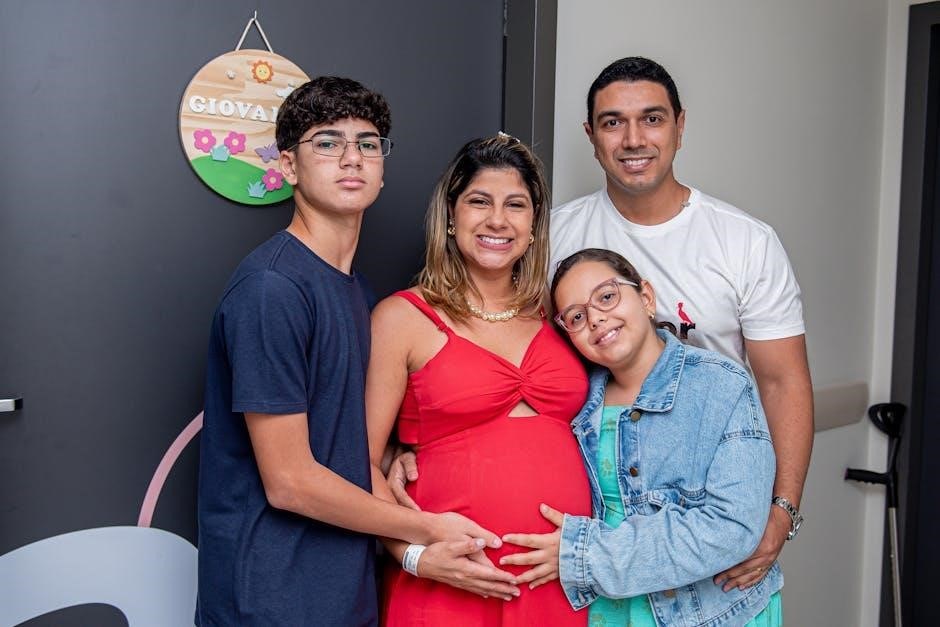indiana parenting guidelines 2023 pdf
The Indiana Parenting Time Guidelines 2023 provide a framework to help parents and courts create effective parenting plans, prioritizing the child’s best interests and emotional well-being.
These guidelines aim to ensure frequent, meaningful contact between children and both parents, offering a structured approach to parenting time arrangements and co-parenting responsibilities.
They serve as a starting point for developing personalized plans, balancing flexibility with consistency to meet the unique needs of each family.
1.1 Overview of the Indiana Parenting Time Guidelines
The Indiana Parenting Time Guidelines 2023 provide a structured framework to help parents and courts establish effective parenting plans. These guidelines emphasize the importance of consistent, meaningful relationships between children and both parents. They are designed to be adaptable, allowing families to customize plans based on their unique circumstances. The guidelines address key aspects such as holiday schedules, overnight parenting time, and provisions for children of different ages. By offering clear recommendations, they aim to reduce conflicts and ensure the child’s best interests remain the priority. This document serves as a valuable resource for both parents and legal professionals navigating co-parenting arrangements;
1.2 Purpose of the 2023 Updated Guidelines
The 2023 Indiana Parenting Time Guidelines aim to provide a fair and consistent framework for parenting plans, ensuring the best interests of the child remain paramount. The updates reflect current research on child development and co-parenting dynamics, offering practical guidance for courts and families. These guidelines help reduce conflicts by establishing clear expectations for parenting time. They also promote stability and predictability for children, while allowing flexibility to accommodate diverse family circumstances. The ultimate goal is to foster healthy relationships between children and both parents, ensuring their emotional and psychological well-being are prioritized.
1.3 Scope and Applicability
The Indiana Parenting Time Guidelines 2023 apply statewide, providing a uniform standard for courts and families to follow when establishing parenting plans. These guidelines are designed to ensure consistency and fairness in parenting time arrangements, while also allowing flexibility to accommodate the unique needs of each family. They are particularly relevant in legal disputes over parenting time and serve as a foundation for creating plans that prioritize the child’s best interests. The guidelines are applicable to all cases involving parenting time unless specific circumstances justify deviations, as determined by the court.
Historical Context and Development
The Indiana Parenting Guidelines have evolved over decades, with updates reflecting changing societal and legal standards. The 2023 version builds on previous frameworks, ensuring they remain relevant and effective in serving the best interests of children and families.
2.1 Evolution of Parenting Guidelines in Indiana
The Indiana Parenting Guidelines were first established to provide a standardized framework for custody arrangements. Over the years, they have undergone revisions to reflect societal changes and legal advancements. The guidelines initially focused on traditional nuclear family structures but now accommodate diverse family dynamics. Updates in the 1990s and 2000s emphasized shared parenting and the best interests of the child. The 2023 guidelines continue this evolution, incorporating modern perspectives on co-parenting, child development, and safety considerations. This historical progression ensures the guidelines remain relevant and effective in supporting families.
2.2 Key Updates in the 2023 Guidelines
The 2023 Indiana Parenting Guidelines introduce several key updates to better serve families. These include expanded provisions for infants and toddlers, emphasizing developmental needs. Holiday schedules have been refined to accommodate modern family dynamics. Electronic communication guidelines now address digital tools like video calls. Additionally, the updates clarify procedures for relocation cases and provide stronger protections for victims of domestic violence. These changes reflect a commitment to aligning the guidelines with contemporary societal needs while prioritizing the best interests of children. The updates aim to foster consistency and fairness in parenting arrangements across Indiana.
Key Principles of the Indiana Parenting Guidelines
The Indiana Parenting Guidelines prioritize the child’s best interests, ensuring both parents’ involvement and fostering a stable, loving environment through clear, fair, and adaptive framework.
3.1 Best Interests of the Child
The Indiana Parenting Guidelines emphasize that the best interests of the child are paramount in all parenting time decisions. Courts consider factors such as the child’s physical, emotional, and psychological well-being, as well as their relationship with each parent. The guidelines stress the importance of stability, consistency, and meaningful involvement of both parents in the child’s life. They also account for the child’s age, adjustment to home and school environments, and any history of domestic violence or substance abuse. The goal is to create a framework that prioritizes the child’s needs while promoting cooperation between parents.
3.2 Frequency and Quality of Parenting Time
The Indiana Parenting Guidelines prioritize both the frequency and quality of parenting time to ensure meaningful involvement of both parents in a child’s life. The guidelines emphasize consistent and regular interaction, tailored to the child’s age, developmental needs, and unique circumstances. Quality parenting time focuses on creating opportunities for parents to engage in activities that promote emotional bonding and support the child’s well-being. The framework encourages flexibility while maintaining stability, ensuring the child benefits from active participation from both parents without feeling overwhelmed by excessive transitions. This balance supports the child’s overall adjustment and development. Courts may adjust schedules to reflect these principles.

3.3 Shared Parenting Responsibilities
The Indiana Parenting Guidelines highlight the importance of shared parenting responsibilities, emphasizing collaboration between both parents to meet the child’s physical, emotional, and psychological needs. Shared responsibilities include mutual decision-making, effective communication, and providing a stable environment. Parents are encouraged to cooperate on education, healthcare, and extracurricular activities. The guidelines promote a balanced approach, ensuring both parents remain actively involved in the child’s life. This shared responsibility fosters a sense of security and continuity for the child, regardless of the parents’ marital status. By working together, parents can create a cohesive and loving upbringing for their child.
Specific Parenting Time Provisions
This section outlines detailed schedules for parenting time, including holidays, weekends, and special events, ensuring consistent and fair arrangements for both parents and the child.
4.1 Holiday Schedules
The Indiana Parenting Guidelines 2023 provide detailed provisions for holiday schedules to ensure fair and consistent arrangements for both parents. Holidays are typically divided or alternated to allow each parent meaningful time with the child. Common holidays include Thanksgiving, Christmas, New Year’s, Independence Day, and others. The guidelines emphasize maintaining the child’s routine while allowing for special holiday experiences. Parents are encouraged to communicate and agree on specific schedules, with provisions for alternating years to ensure fairness. Additionally, the guidelines suggest that holiday schedules should be incorporated into the overall parenting plan to maintain consistency and avoid conflicts. Exceptions may apply based on the child’s best interests or existing family traditions. If parents cannot reach an agreement, the court may intervene to establish a fair and reasonable holiday schedule for the benefit of the child.
4.2 Overnight Parenting Time
The Indiana Parenting Guidelines 2023 address overnight parenting time to ensure stability and continuity for the child. The guidelines consider factors such as the child’s age, adjustment capabilities, and the parents’ living situations. Overnight visits are generally encouraged to foster a meaningful relationship with both parents. The guidelines emphasize the importance of maintaining consistent routines and ensuring the child’s emotional well-being. Practical considerations, such as the distance between parents’ homes and the child’s school or extracurricular activities, are also taken into account. The goal is to balance the child’s needs with both parents’ involvement in their care.
4.3 Parenting Time for Infants and Toddlers
The Indiana Parenting Guidelines 2023 provide specific considerations for parenting time with infants and toddlers. The guidelines emphasize the importance of maintaining the child’s routine and ensuring their physical and emotional needs are met. Frequent, short periods of parenting time are often recommended to accommodate their developmental stage. The court may consider the primary caregiver’s role and the need for consistency in daily care. The guidelines also address overnight arrangements, prioritizing the child’s stability and adjustment. Parents are encouraged to cooperatively establish a schedule that supports the child’s well-being and fosters a strong bond with both parents.
4.4 Parenting Time for Children 3 Years and Older
The Indiana Parenting Guidelines 2023 outline specific provisions for children aged 3 years and older, focusing on age-appropriate parenting time arrangements. The guidelines suggest more structured schedules, including regular weekends, mid-week visits, and extended time during holidays or summer breaks. Courts consider the child’s school schedule, extracurricular activities, and the ability to maintain consistent routines. Flexibility is encouraged to accommodate the child’s growing needs and interests. The guidelines emphasize ensuring the child has meaningful relationships with both parents while maintaining stability and predictability. Parents are encouraged to collaborate on schedules that align with the child’s developmental stage and lifestyle.

Legal Process and Court Procedures
The legal process involves filing motions, attending hearings, and interacting with court officials to establish or modify parenting time arrangements under Indiana’s guidelines.

5.1 Filing for Parenting Time Guidelines
Filing for parenting time under Indiana’s 2023 guidelines involves submitting a petition with the court, detailing proposed schedules and arrangements. Parents may file jointly or individually. Required documents include completed parenting time worksheets and, if applicable, a parenting plan. The court clerk assists with forms and fees, though some may qualify for fee waivers. Once filed, the court schedules an initial hearing to review the request. Attendance is mandatory, and parents should arrive prepared to discuss their proposals. The court prioritizes the child’s best interests when evaluating requests.
5.2 Mediation and Alternative Dispute Resolution
Mediation is a key alternative dispute resolution method under Indiana’s 2023 parenting guidelines, encouraging parents to resolve conflicts without court intervention. A neutral mediator facilitates discussions to create mutually acceptable parenting plans. This process is cost-effective, reduces conflict, and maintains parental cooperation. Mediation is voluntary but strongly encouraged by courts. If unsuccessful, cases proceed to a contested hearing. Parents are urged to engage in good faith, focusing on the child’s best interests. Mediation can also address post-order disputes, ensuring flexibility in parenting arrangements as family circumstances evolve.
5.3 Court Hearings and Orders
Court hearings are conducted when disputes over parenting time cannot be resolved through mediation or agreement. The court considers evidence, testimonies, and the best interests of the child to issue binding orders. Judges may order parenting plans that outline schedules, decision-making responsibilities, and geographic restrictions. The Indiana Parenting Guidelines emphasize consistency and predictability for children. Orders are enforceable and may include specific provisions based on the family’s unique circumstances. Courts aim to balance fairness to both parents while prioritizing the child’s well-being and stability; Orders are legally binding and must be followed unless modified by the court.
Modifying Parenting Time Arrangements
Modifying parenting time requires a significant change in circumstances impacting the child’s best interests. The court evaluates whether adjustments align with the child’s needs and stability.
6.1 Grounds for Modification
Modification of parenting time arrangements requires demonstrating a substantial change in circumstances significantly impacting the child’s best interests. Key grounds include a parent’s relocation, changes in work schedules, or new relationships affecting the child’s well-being. The court considers the child’s age, wishes (if mature), and physical or mental health needs. Evidence of non-compliance with existing orders or a parent’s inability to provide a stable environment may also warrant changes. The focus remains on ensuring the arrangement aligns with the child’s evolving needs and promotes a stable, loving relationship with both parents.
6;2 Procedure for Filing a Modification Request
To modify parenting time, a parent must file a motion with the court, citing specific grounds under the Indiana Parenting Guidelines. The request must include a proposed parenting plan and supporting evidence. The filer must serve the other parent legally, ensuring they receive the documents. A hearing may be scheduled, and mediation could be required to resolve disputes. The court will review the request, focusing on the child’s best interests. Both parents must comply with the existing order during the process unless temporarily modified by the court.

Enforcement of Parenting Time Guidelines
Enforcement involves court oversight to ensure compliance with parenting time orders. Remedies for non-compliance may include contempt proceedings or modifications to existing arrangements to maintain consistency.
7.1 Remedies for Non-Compliance
When a parent fails to comply with parenting time guidelines, courts may impose remedies such as contempt of court, compensatory parenting time, or monetary fines. In severe cases, the court may modify the existing parenting time order to ensure fairness and consistency. The court prioritizes the child’s best interests and may require the non-compliant parent to attend counseling or mediation. Enforcement measures aim to balance accountability with the need for ongoing cooperation between parents, ensuring the child maintains a stable relationship with both parties. Remedies are tailored to address specific violations while promoting long-term adherence to the established guidelines.
7.2 Role of the Court in Enforcement
The court plays a central role in enforcing Indiana Parenting Time Guidelines by ensuring both parents adhere to the established order. Courts monitor compliance and address disputes through legal proceedings. If violations occur, the court may enforce parenting time orders using contempt powers, order make-up parenting time, or adjust existing arrangements. The court’s primary goal is to uphold the best interests of the child while maintaining fairness and accountability for both parents. Judicial oversight ensures that parenting time guidelines are respected and effectively implemented, providing a structured framework for co-parenting responsibilities.

Impact on Children and Families
The Indiana Parenting Guidelines aim to promote emotional stability and consistency for children while fostering healthy family relationships. They help reduce conflict and ensure children’s needs are prioritized.
8.1 Psychological Effects on Children
The Indiana Parenting Guidelines emphasize the importance of minimizing psychological harm to children during parental separation. Consistency and predictability in parenting schedules help reduce stress and anxiety for children. By ensuring both parents remain actively involved, the guidelines foster a sense of security and stability, which are crucial for a child’s emotional well-being. The focus on minimizing exposure to parental conflict supports healthy psychological development and long-term mental health outcomes for children.
8.2 Balancing Co-Parenting Responsibilities
The Indiana Parenting Guidelines 2023 emphasize the importance of balancing co-parenting responsibilities to ensure fairness and equality. Parents are encouraged to share decision-making and scheduling responsibilities, fostering a cooperative environment. This balance helps children maintain strong relationships with both parents, reducing feelings of loss or favoritism. By promoting mutual respect and collaboration, the guidelines aim to create a stable and consistent environment for children. This approach minimizes conflict and ensures that both parents contribute actively to their child’s upbringing, aligning with the overall goal of prioritizing the child’s best interests.
Communication and Co-Parenting
Effective communication and co-parenting are vital for successful parenting time arrangements. The Indiana Parenting Guidelines 2023 encourage open dialogue, mutual respect, and cooperation between parents to ensure the child’s best interests are met. Parents are urged to prioritize clear and consistent communication, avoiding conflict and focusing on collaborative decision-making. These practices foster a stable environment, promoting emotional well-being and strong relationships for the child.
9.1 Effective Communication Strategies
The Indiana Parenting Guidelines 2023 emphasize the importance of effective communication to ensure the best interests of the child. Parents are encouraged to use clear, respectful, and timely communication, avoiding hostile or confrontational language. Active listening and empathy are key to resolving disputes amicably. Regular scheduling of co-parenting meetings can help address concerns proactively. Utilizing co-parenting apps or shared calendars can improve organization and reduce misunderstandings. Maintaining open lines of communication fosters a collaborative environment, ultimately benefiting the child’s emotional and psychological well-being. Consistent and cooperative communication strengthens the co-parenting relationship.
9.2 Managing Conflicts Between Parents

Managing conflicts between parents is crucial to maintain a stable environment for the child. The Indiana Parenting Guidelines 2023 recommend resolving disputes through mediation or counseling before escalating to court. Parents should focus on the child’s needs rather than past conflicts. Open dialogue, compromise, and mutual respect are essential. If disagreements persist, seeking professional assistance, such as a parenting coordinator, can help. Courts may intervene if conflicts hinder the child’s well-being. Prioritizing cooperation ensures consistent and nurturing care for the child, aligning with the guidelines’ objectives. Effective conflict resolution benefits both parents and the child.

Make-Up Parenting Time
Make-up parenting time allows parents to compensate for missed time due to unforeseen circumstances. It ensures consistency in the child’s relationship with both parents, fostering stability and emotional well-being.
10.1 Eligibility and Conditions
Eligibility for make-up parenting time in Indiana is determined by mutual agreement or court order. It is typically granted when a parent misses scheduled time due to unforeseen circumstances. Conditions include ensuring the child’s best interests are prioritized and that make-up time does not disrupt the child’s routine. Parents must agree on the timing and duration, and if disputes arise, the court may intervene to mediate. Make-up time should be scheduled promptly and reasonably, avoiding conflicts with existing parenting plans. The child’s needs and stability remain the primary focus in all arrangements.
10.2 Scheduling Make-Up Time
Scheduling make-up parenting time requires mutual agreement between parents or court approval. Parents should prioritize the child’s routine and well-being when selecting dates. Make-up time should be scheduled within a reasonable period after the missed parenting time. If disputes arise, parents are encouraged to use mediation or file a motion with the court. The make-up schedule must be documented and shared to avoid conflicts. Consistency and fairness are key to ensuring the child’s needs are met while maintaining both parents’ involvement. Courts may adjust schedules if necessary to uphold the child’s best interests.

Special Considerations
The 2023 Indiana Parenting Guidelines address unique family circumstances, ensuring the child’s safety and well-being. Special considerations include protective measures and exceptions for extraordinary situations.
11.1 Domestic Violence and Parenting Time
The Indiana Parenting Guidelines 2023 emphasize safeguarding children and victims of domestic violence. Courts prioritize the child’s physical and emotional safety, potentially restricting parenting time for the abusive parent. Supervised visitation may be ordered to ensure the child’s well-being. The guidelines also address how protection orders impact parenting time arrangements. Parents with a history of domestic violence may face limitations, requiring them to demonstrate changed behavior before parenting time is reinstated. The court’s primary focus remains the best interests of the child, balancing safety and parental relationships.
11.2 Substance Abuse and Parenting Time
The Indiana Parenting Guidelines 2023 address substance abuse as a critical factor in parenting time decisions. Courts may restrict parenting time if a parent’s substance abuse endangers the child’s well-being. Supervised visitation is often required in such cases. Parents may need to undergo substance abuse assessments or complete rehabilitation programs to regain parenting time. The guidelines emphasize the child’s safety while encouraging rehabilitation and reunification when possible. Proof of sobriety and compliance with court orders may be necessary to restore parenting rights.

Resources for Parents
The Indiana Parenting Guidelines 2023 PDF offers access to resources, including support organizations, parenting classes, and legal aid services, to assist families in navigating co-parenting effectively.
12.1 Accessing the 2023 Guidelines PDF
The Indiana Parenting Guidelines 2023 PDF is available for free download on the Indiana Judicial Branch website. Parents can access the document by visiting the official site and navigating to the family law section. The PDF is fully searchable and printable, making it easy to reference specific sections. It provides detailed information on parenting time, holiday schedules, and modifications. This resource is essential for understanding legal obligations and ensuring compliance with state guidelines. The PDF is updated annually to reflect current laws and best practices in co-parenting.
12.2 Support Organizations and Services
Several organizations in Indiana offer support to parents navigating the 2023 Parenting Guidelines. The Indiana Supreme Court provides resources on its website, including links to local family law services. Additionally, organizations like the Indiana Coalition Against Domestic Violence and the National Parents Organization offer guidance on co-parenting and conflict resolution. These groups often provide counseling, educational programs, and legal assistance to help parents adhere to the guidelines. Utilizing these services can foster healthier family relationships and ensure compliance with state parenting time standards.
The Indiana Parenting Guidelines 2023 provide a comprehensive framework to ensure the best interests of children. They emphasize shared responsibilities, consistent routines, and open communication, fostering healthy family relationships while addressing modern parenting challenges.
13.1 Summary of Key Points
The Indiana Parenting Guidelines 2023 aim to prioritize the best interests of children by providing a structured framework for parenting time. Key points include emphasizing shared responsibilities, ensuring frequent and meaningful parent-child interactions, and addressing factors like domestic violence and substance abuse. The guidelines also outline specific provisions for holidays, overnight stays, and age-appropriate parenting schedules. They encourage open communication and offer resources for resolving disputes. By adhering to these guidelines, parents and courts can create stable, loving environments that promote children’s emotional and psychological well-being while balancing the needs of all family members.
13.2 Importance of Adhering to Guidelines
Adhering to the Indiana Parenting Guidelines 2023 ensures stability and predictability for children, fostering their emotional and psychological well-being. Consistent parenting schedules reduce confusion and anxiety, allowing children to thrive in a structured environment. Compliance also promotes cooperation between parents, minimizing conflicts and the need for court intervention. Failure to follow the guidelines may result in legal consequences, such as being held in contempt of court. By prioritizing these standards, parents demonstrate a commitment to their children’s best interests, ensuring a fair and nurturing upbringing while maintaining legal accountability and emotional harmony within the family.


